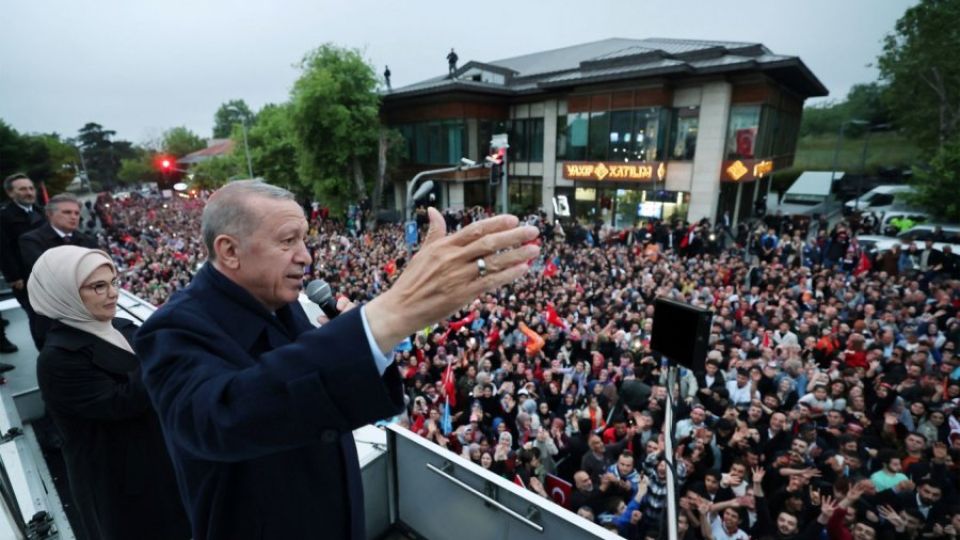June 1, 2023
JAKARTA – The slim victory of President Recep Tayyip Erdogan, with 52.14 percent of the vote against his long-standing rival, Kemal Kilicdaroglu’s 47.86 percent in the May 21 election runoff demonstrates how polarized Turkey now is, regardless of Erdogan’s reconciliatory speech.
Kilicdaroglu has been Erdogan’s strongest rival since 2010 and is the antithesis of the grandstanding, powerful president. The stiff competition between the Islamist and the so-called nationalist and secular camps will therefore continue to linger in Turkish politics.
To a certain extent, Indonesia is experiencing a similar divide as a result of two presidential elections in 2014 and 2019, which saw Joko “Jokowi” Widodo triumph over Prabowo Subianto. Both Indonesia and Turkey, the world’s prominent majority Muslim nations, look like two sides of the same coin in their choice of a populist leader who exudes ambitions to consolidate power.
In Indonesia, President Jokowi coopted the opposition by offering them strategic posts in the Cabinet and other state agencies in the name of national unity. This maneuver has left only two minority parties, the secular Democratic Party and the Islamist Prosperous Justice Party (PKS), in the opposition, rendering the checks and balances mechanism ineffective.
In Turkey, Erdogan has acted as an authoritarian leader who would not hesitate to silence the opposition and crack down on them, as happened after the failed coup attempt in 2016. Erdogan won the 2018 election and amended the Constitution, allowing him to play a greater role than in the past.
Many Indonesians adore Erdogan and view him as a true model of an Islamic leader. In Aceh, the only Indonesian province that enforces sharia law, people held a special thanksgiving prayer in the capital city of Banda Aceh on Monday to celebrate Erdogan’s victory. In the last two presidential elections, Aceh voted for Prabowo.
The Turkish leader will always be remembered in Aceh for his contribution to the people after the world’s worst tsunami devastated the province in December 2004, claiming more than 200,000 lives. He sent 15,000 tonnes of food, clothing and medicines and built 1,000 houses for the Acehnese.
President Jokowi also joined world leaders in congratulating Erdogan. “Warmest congratulations to my dear brother President Erdogan of Türkiye, on his re-election. Ready to continue & strengthen Indonesia-Türkiye long-standing strategic partnership, for the benefit of our peoples,” said President Jokowi on his official Instagram, using the Turkish government’s preferred spelling.
Erdogan’s Justice and Development Party (APK) has controlled Turkey since 2003 when it won the election and the following polls. The party is often associated with the Muslim Brotherhood in Egypt and, to a certain extent, the PKS in Indonesia. Egypt bans the Islamist party, a move that has affected the relationship between Turkey and Egypt.
In early 2008, the Turkish parliament lifted a ban on headscarves in university campuses and introduced other pro-Islam policies just to attract female Muslims. Opponents accused Erdogan of destroying Turkey’s secular principles, but instead, he became more popular.
Erdogan also succeeded in upscaling the international profile of Turkey in global politics, especially in Europe and the Middle East, with Saudi Arabia and Iran. Turkey is a NATO member, but Erdogan has built a closer relationship with Russian President Vladimir Putin than with Ukraine.
Kilicdaroglu has refused to concede defeat, and his supporters will continue their struggle to fight Islamist Erdogan, who is internationally perceived as a leader who combines authoritarian rule and divide-and-rule management.
As described by European media and Turkey’s opposition, after the election, the short-term priority for Erdogan is to get full European Union membership after decades of failed attempts. The second but most difficult challenge for him is to restore the country’s chaotic economy as a consequence of his erratic policies.
Like in Indonesia, people choose a populist leader who can satisfy their stomachs and provide them with subsidies and aid. For them, international prestige does not feature in their needs. The Turkish people expect more of the same from Erdogan.


